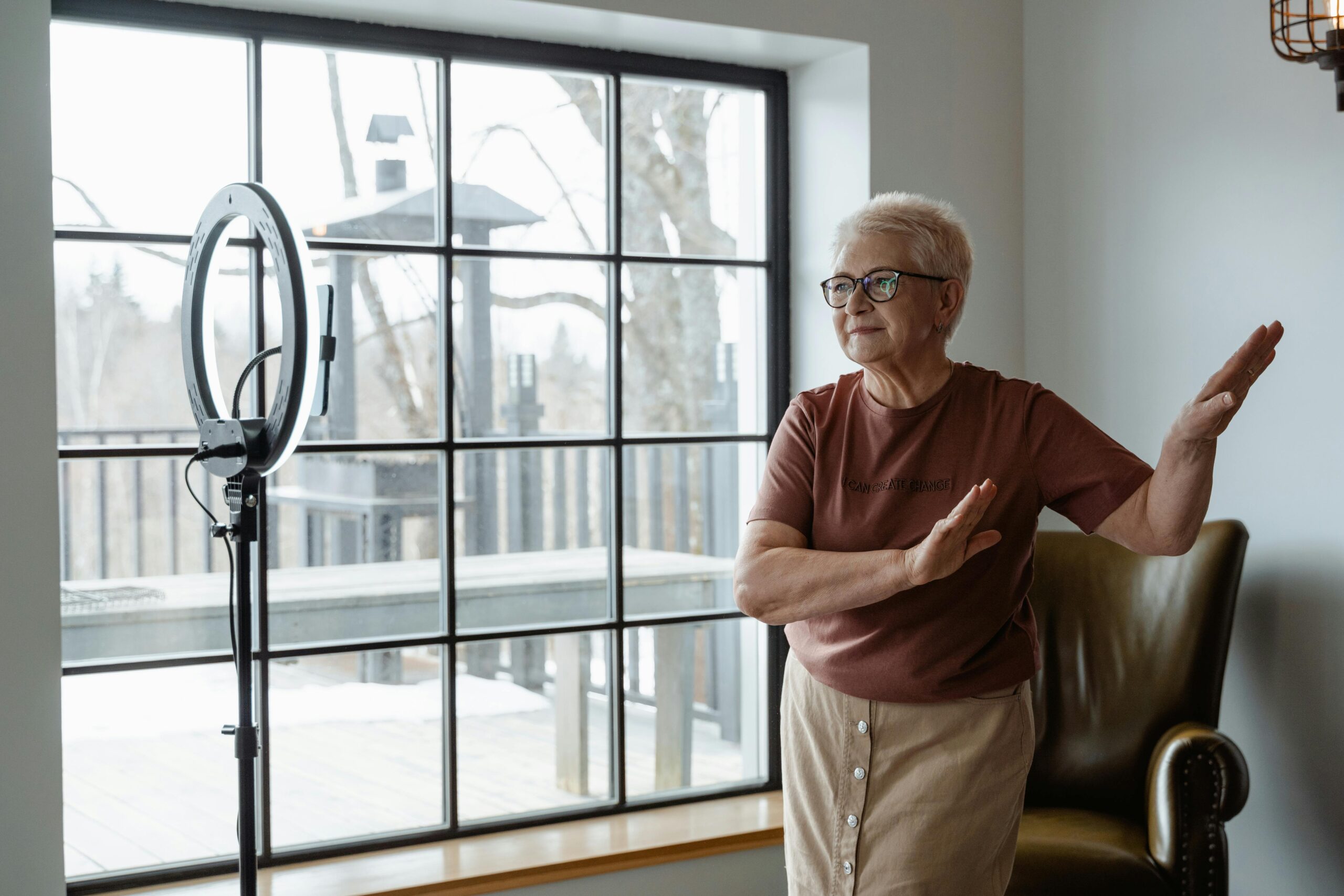When we retire, it means staying active. There, you transform yourself from being very busy at work to relaxed, which is both a good and a bad change. However, being active is very important for our physical and mental health and quality of life—we know it may even prolong life! In this article, we examine why staying active in retirement should be a crucial senior health strategy.
Remaining physically active after retirement is crucial. Exercise is beneficial not only for our flesh but also for our heads and hearts. It calms your heart, actions, and bones. It also reduces the risk of dreadful diseases like diabetes, obesity, and, in some cases, cancer.
On top of that, exercise increases our brain power and makes us feel good by improving depression and anxiety. This is good news for retirees. []
Key Takeaways
- Staying active after retirement is crucial for maintaining physical and mental health
- An active lifestyle can enhance the quality of life and potentially increase longevity
- Engaging in regular physical activity can improve cardiovascular health, strengthen muscles and bones, and reduce the risk of chronic conditions
- Active lifestyles have been linked to improved cognitive function, mood and reduced symptoms of depression and anxiety
- Maintaining an active lifestyle during retirement provides a wealth of benefits for seniors
Understanding the Importance of Staying Active After Retirement
Retirement is a big change, giving seniors a chance to enjoy their golden years. However, staying active is key for both the body and mind. Exercise and mental activities are linked, improving life quality and even helping live longer.
Physical and Mental Health Connection
Exercise keeps the body fit and boosts the mind. Research shows that active seniors have better memory and problem-solving skills. This link is vital for a sharp mind in retirement.
Quality of Life Enhancement
An active retirement improves life quality. Exercise and mental activities lift mood and reduce disease risk. Healthy habits in retirement bring joy and energy to the golden years.
Longevity Benefits
- Studies show active living can lead to longer life for retirees.
- Exercise and mental activities lower disease risk, like heart disease and diabetes.
- Active retirees can live longer, healthier, and more fulfilling lives.
Staying active in retirement is essential for well-being. It opens up a world of benefits for a fulfilling golden years.
Physical Exercise Options for Retired Adults
As we age, staying active is key for our health. Different exercises can benefit retirees, ranging from better physical health to sharper minds and more social connections. Let’s look at some activities that can keep retirees fit and energetic.
Low-Impact Activities
Low-impact exercises like walking, swimming, and cycling are great for retirees. They’re easy on the joints but still boost heart health. These activities help improve endurance, lower fall risks and keep retirees independent.
Strength Training for Seniors
Strength training is vital for retirees to keep muscles and bones strong. They can use bodyweight, resistance bands, or light weights, which helps them perform daily tasks easily.
Balance and Flexibility Exercises
Keeping balance and flexibility is key to preventing falls and staying mobile. Yoga, Tai Chi, and balance exercises help. They improve stability, range of motion, and physical function, making it easier for retirees to stay active and avoid injuries.
By trying different exercises, retirees can enjoy many benefits. These include better physical health, mental well-being, and more independence. An active lifestyle in retirement can make life more fulfilling.
| Exercise Type | Benefits | Recommended Activities |
| Low-Impact | Resistance band exercisesBodyweight exercise slight weightlifting | WalkingSwimmingCycling |
| Strength Training | Improved enduranceReduced joint stress increased mobility | Improved stabilityIncreased range of motion reduced fall risk |
| Balance and Flexibility | Improved stabilityIncreased range of motionReduced fall risk | YogaTai ChiBalance-focused exercises |
By mixing these exercises, retirees can stay physically active. This leads to better health and a higher quality of life in retirement.
Mental Wellness Through Active Engagement
You must keep your minds sharp when you retire. Practising things we like can help us stay active and reduce stress or anxiety. They can live a better life and be more fulfilled.
Keeping active prevents our minds from going blank. Things like learning, puzzle-solving, or a hobby keep our brains sharp. This can also result in better mental health and a more meaningful life purpose.
Active people are also less likely to be stressed and anxious once they retire. Helping and feeling good doing these things will make you get in easily. It keeps us all connected and makes our new life a little more enjoyable
- Engage in mentally stimulating activities, such as learning a new language, playing chess, or taking up a creative hobby.
- Participate in group activities and social gatherings to foster a sense of community and combat feelings of isolation.
- Explore opportunities for lifelong learning, such as attending lectures, taking classes, or joining a club or organization.
- Incorporate relaxation techniques, such as meditation or mindfulness practices, to manage stress and anxiety.
By being active, retirees can enjoy a fulfilling retirement. They can live a better life and find purpose in their new chapter. It’s all about keeping our minds sharp and our spirits high.
Social Activities and Community Involvement
Retirement is a chance for seniors to focus on socializing and helping out in their communities. Being around others can greatly improve physical and mental health, making retirement lively and satisfying.
Group Exercise Programs
Retirees can join group exercises to stay fit and meet new people. These programs are found at community centres and senior facilities. They offer activities like yoga and tai chi in a friendly setting.
These classes help build friendships and a sense of belonging.
Community Centers and Senior Groups
Community centres and groups for seniors are key for socializing. They have many activities, from learning new things to volunteering. These places help retirees meet others, try new hobbies, and help their community.
Building New Relationships
Retirement brings big changes, and making new friends is rewarding. Seniors can find volunteer opportunities for retirees or join clubs for hobbies. These connections give a sense of purpose and improve well-being.
“Staying socially engaged is crucial for maintaining a healthy and fulfilling retirement. It’s an opportunity to discover new interests, make meaningful connections, and give back to the community.”
Retirees can enjoy a lively and rewarding life by participating in social activities. These connections are good for physical, mental, and emotional health. They make retirement a truly fulfilling journey.
Creative Pursuits and Hobbies in Retirement
Retirement is a great time for seniors to explore their creative sides. They can try new hobbies and learn new things. This can make them feel happy and fulfilled.
Many seniors enjoy continuing their education. Universities and colleges offer continuing education for seniors. They can learn about art, writing, computers, or languages.
- Painting, drawing, or pottery classes can unleash hidden artistic talents.
- Joining a book club or writing group can foster intellectual stimulation and social connections.
- Mastering a musical instrument or learning to dance can be challenging and rewarding.
- Gardening, birdwatching, or hiking can connect retirees with nature and the great outdoors.
These hobbies do more than just keep the mind sharp. They also improve physical health and give a sense of purpose. Seniors who enjoy their hobbies feel more alive, connected, and happy.
Whether finding a new passion or revisiting an old one, there’s always something new to try. The world of hobbies and activities for retired adults is full of opportunities for growth and joy.
Maintaining Daily Routines and Healthy Habits
Starting retirement means setting up a daily routine and healthy habits. This helps keep your life active and fulfilling. Plan your day and set goals to balance your retirement well.
Structured Activity Planning
Make a daily or weekly plan with different activities. Include exercise, mental challenges, and social time. This keeps you focused and on track with your retirement dreams. Try different plans until you find what suits you best.
Setting Achievable Goals
Set clear, measurable goals for your retirement. Goals like walking more, learning something new, or joining events give you purpose. Achievable goals help you stay active and committed to a good retirement.
Progress Tracking Methods
Keep track of your progress and celebrate your wins. Use tools like fitness trackers or journals to monitor your activities. This helps you see what’s working and what needs tweaking, making your retirement rewarding.
FAQ
What are the benefits of staying active after retirement?
The Benefits of Being Active After Retirement This is good for general health and wellness, making life easier in the long run. It also enables the elderly to be healthy and active longer.
Staying mentally sharp and avoiding disease helps seniors remain active. This makes retirement even more rewarding.
What are some physical exercise options for retired adults?
Low-impact activities such as walking, swimming, or cycling are things that retirees can do. Muscles and bones have to be strong. Strength, balance and flexibility exercise to reduce the risk of falling for seniors
You may want to speak with a doctor. If you need to exercise, the best approach can help.
How can mental wellness be improved through active engagement?
Being mentally engaged helps the mind stay alert. It can mean picking up new skills, talking to each other, or doing something you enjoy. Being mentally engaged makes retirement stress and anxiety manageable.
Keeping the brain healthy helps fight mental health issues while staying connected and active is yet another way of looking after our minds. They keep senior citizens engaged and content.
What are the benefits of social activities and community involvement for retirees?
Group exercises and community centres help retirees stay connected. Correlates with less loneliness and isolation. It also provides purpose and meaning.
It is about creating new connections. It allows seniors to become part of a community.
How can retirees find fulfilment through creative pursuits and hobbies?
Creative Pursuits such as art, music, or gardening are fulfilling. They allow seniors to do something, as express themselves / learn something … It also makes a person feel useful.
Education is the door to other worlds. It keeps your mind busy and active.
What strategies can help retirees maintain daily routines and healthy habits?
It can be useful to make a plan for where you are going and what your targets should be. Progress tracking methods, among other things, keep retirees active and financially stable in their retirement decades.










